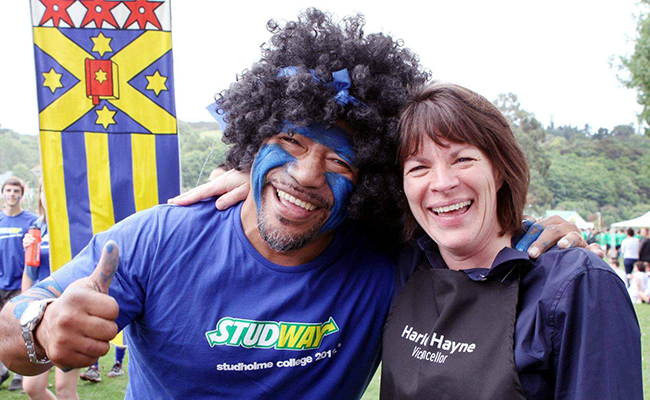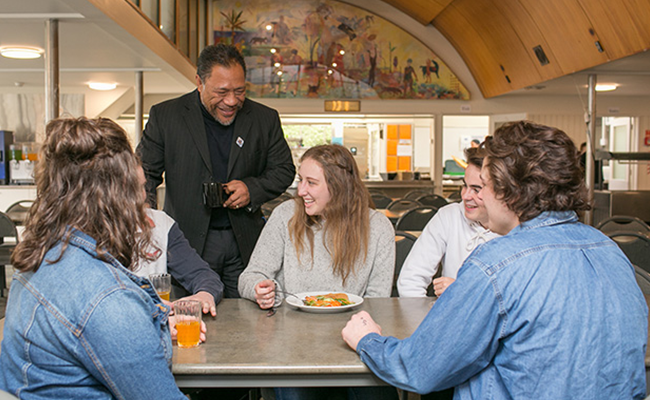 In his element … Warden Ziggy Lesa in amongst his charges as students gear up for a toga party at Forsyth Barr Stadium.
In his element … Warden Ziggy Lesa in amongst his charges as students gear up for a toga party at Forsyth Barr Stadium.
After two decades as a college warden - at Studholme and Cumberland - Ziggy Lesa is retiring from his dream job. Communications Adviser Gail Goodger caught up with the much-loved campus figure
Asking Ziggy Lesa what people should know as he retires has the eyes on his usually cheery face welling as he unconsciously reaches for the pendant carving that symbolises his family: “I want them to know how grateful I am to the University of Otago.'
“I want that to come out nice and clear,” he says. “I had wanted to be able to say that without tearing up.”
When the University accepted him as an adult student in 1997 then as a staff member, that set up Ziggy and his wife Raewyn in life, supported their family, and is now helping some of their children build their own family's foundations after the arrival of “little, wee grandchildren”.
“I look back on my journey and I guess it's a great Otago University story. I was a young Pacific Island kid from South Auckland who knew nothing about university. I didn't know what a semester was,” Ziggy says.
Changing times
University was not even on his radar when he left De La Salle College in Auckland. The Inland Revenue Department (IRD) was offering internships and he could keep his Pizza Hut job on the side, for its bonus after-work socialising.
While at the IRD, Ziggy was also working with at-risk youth through various church organisations and he ended up working full-time job for Te Hou Ora with predominantly at-risk young Māori then became a youth Pastor in Tauranga with a congregation of mostly wealthy Pakeha families.
“The first thing we did was pull out a map – where is Otago? We're going to have to go all the way down there?"
Both sets of young people presented different challenges but working with them helped Ziggy form the foundations of understanding young people. It was during his time as a youth pastor, while he was in his late 30's, that a friend had suggested he would make a great teacher.
Ziggy decided to study so he could teach, to keep helping young people make positive changes while also earning more to support his family – son Caleb was five years old and daughter Alexandra was about to be born in Tauranga.
Different times
Ziggy thought his university applications were going well: “I was pretty sure I was going to Auckland. I resigned from my youth pastor job to get ready to go and I got a shock when Auckland turned me down. My faith was a bit shaken, that had been where I was sure I was going. Then I got this letter from Otago University saying, 'we'd love to have you down here'.
“The first thing we did was pull out a map – where is Otago? We're going to have to go all the way down there? I'm very, very grateful to the University of Otago, firstly because it gave me the opportunity to study and that opened a door for me.”
Not only was the learning curve steep for a degree at the School of Physical Education in 1997 – followed by a College of Education secondary school teaching diploma – but Ziggy also had to adapt from a multi-cultural environment to a Euro-centric one. It was almost as if he had moved to new country with a different language.
“We didn't have all the support networks [on campus] they have these days, you had to find your own way through.”
Starting times
Household finances were tight as well while studying. After paying rent and expenses each week, only $40 was left for Ziggy, his nurse wife Raewyn, Caleb, and Alexandra. So Ziggy applied for a part-time deputy warden role at Aquinas College, even though before arriving on campus “I didn't even know colleges existed . . . I thought they sounded like luxury hotels”.
Other students Ziggy was studying with had talked about the warm college accommodation, the food provided, and college tutorials: “I really would have loved to have gone to some of those tutorials.”
On getting the job as deputy warden, “I thought I was in paradise”.
He was helping young people “get into the careers they wanted to and having a bit of fun along the way. I remember thinking it was a great feeling knowing that you were working with students that semi-knew where they were wanting to go in life – working at the top of the cliff rather than at the bottom”.
The position also came with accommodation for his family, which grew at Aquinas to include Josiah.
 Ziggy with former Vice-Chancellor Professor Harlene Hayne
Ziggy with former Vice-Chancellor Professor Harlene Hayne
Progressive times
Ultimately, the part time deputy warden position became full-time which Ziggy says was very supportive of the “amazing” warden Christine Brown and helped introduce him to a new career path in the accommodation division, which he had never considered.
“She was hands-down the best warden I've ever worked for,” he quips. She was actually the only warden he has ever worked for and is still a great friend and mentor.
As graduation neared, Ziggy had a job lined up at De La Salle, but a warden role was also coming up at Studholme College in 2002, so he decided to risk waiting and being “cheeky enough to apply for it”.
“I am very grateful to Peter Vanderlay, the manager of Accommodation Services at the time, for looking outside the box of what a typical warden would be and providing me with the opportunity and privilege of leading Studholme College,” Ziggy says. He hopes the faith Peter placed in him has paid off for the University.
After 23 years on campus, Ziggy is proudest of helping the University learn more about the Pacific way and that “even though the approaches I put in place at Studholme might not have been the ones that you would normally have expected past wardens to do, that it's okay and that it can work”.
Family times
Ziggy aimed to be a warden because he wanted to set a college's values.
Coming from a large Samoan family, Ziggy naturally felt the staff and 185 students at Studholme should be a big family as well, which included embedding his children in college life.
“I think it's quite important if you have a family that they be part of it, not to the extent it becomes detrimental to your work, but a lot of kids' families are dissolving around them from what I see and they're not quite sure what a family should be. It's important to let the students know they're okay, whatever the family definition – this's my family, let me meet yours when I can.”
 Ziggy Lesa says he enjoyed creating a familial environment for the students in his care. Photo: Sharron Bennett.
Ziggy Lesa says he enjoyed creating a familial environment for the students in his care. Photo: Sharron Bennett.
Accepting times
Because Ziggy had discovered through working with a wide range of young people that they all want to be “valued, loved and accepted for who they are, and helped with their challenges,” he asked his Studholme team to make student residents feel they had that support.
The catch phrase was “everybody matters”.
“If you say 'everybody is loved' people look at you like you're a weirdo … it's not that crazy love definition you see on TV, it's accepting people for who they are and letting them know that they matter. I think it helps make a place successful.”
His staff worked hard to let students make their own decisions then learn the consequences, so they could grow: “We wanted to give our students some room to be themselves.”
“We united students from Auckland to Invercargill, from all walks of life. Our biggest enemy was rejection,” Ziggy says.
That culture saw the college become increasingly popular and known as one of the friendliest on campus.
His favourite event every year was the women's rugby competition. Most of Studholme's team – which he helped coach – had never played before, making it scary for them. Girls from wealthy families played side-by-side with girls from not so wealthy families, young women from the north played with young women from the south, and girls of all ethnicities mixed together.
They developed an accepting sisterhood on their “scary but exciting venture,” ending up at the dining table together more and more often.
Staffing times
Studholme College Deputy Warden Rachael Carson found Ziggy accepting from the start: “He said 'use your initiative and back yourself', but he was there for advice.”
And when she went to him with ideas, Ziggy was open to change.
While Ziggy is a lot of fun around students, his goals have always been serious, Rachael says. He wanted the best for the students and had a laser focus on them getting their degrees, so was constantly thinking about how the college could achieve those goals.
Sometimes it was simply by appreciating their antics. He was once mystified how a 1.8 metre stuffed bear toy provided for exam-time hugs turned up with its head ripped off and leaking copious stuffing. A check of the CCTV footage had him virtually laughing his own head off – some boys had been rugby tackling the bear when its head popped off, then a boy popped it on his head and ran around the college, she says.
Other times Ziggy knew how to tell off a student. When dealing with a young man whose regular late returns home to the college kept waking residents, Ziggy told him how the college aimed to be an environment where students could study and sleep, then asked the young man if he could help with that.
Ziggy was also literally living proof a Pacific Island student could succeed at Otago, and was so accepting of Rachael he dubbed her the family's fifth child, she says.
Faithful times
Acceptance also runs through the Lesa family's backbone of Christianity, which has seen Ziggy favour Presbyterian Pentecostal beliefs because they give him “a personal relationship with Christ,” and the congregation explores controversial issues through healthy discussions, letting different views co-exist.
For Ziggy, faith “gives me peace”. “In God and in Christ, I have that very simple faith that they just love me for who I am. They understand I will stuff up just when I think I've got everything together” – and that makes any troubles not feel as big.
Pacific times
For many Pacific students, the college headed by 'Uncle Ziggy' became their home away from home. As Otago started a foundation course for health science papers that attracted mainly Pacific and Māori students, both Studholme and neighbouring Arana College were asked to get involved.
Over time, Pacific and Māori students made up 35-40 per cent of Studholme's residents, with some foundation students often staying the following year as they started their health science degree.
“That's a quite a good system, especially for Māori and Pacific people, who like to help each other,” he says.
Beneficial times
For Ziggy's children – including Manaia who was born at Studholme – being brought up in colleges has been “flippin' huge”.
“I don't think our kids will ever have problems socialising. When you see them in a social setting and interacting with people, they do it very naturally . . . (at a college) you meet so many different types of students, from around the country, from many nations.”
The college meals were a bonus as well: “Have you ever tried feeding a teenager?”
Having accommodation provided onsite also meant Ziggy and Raewyn could buy a home in Anderson's Bay as an investment, which is now home to online leadership coaches Caleb and his wife Donna and their six-month-old baby daughter Zali.
A unit will be built on the section as well for COVID-19 refugees Josiah, wife Kaila and baby boy Matias, who is now three months old. They had to return from Australia, so now Josiah will start training as a teacher next year.
Ziggy is retiring to another house in Mosgiel, with Raewyn and Manaia, who is 14. Daughter Alexandra is working in IT in Auckland.
Missing times
Retiring will mean missing the staff, the students' antics, and “looking after them – being a dad you just want to make sure they're okay.”
“I'd tell parents every year that I know the most important things in their lives are not the houses they live in, or the careers they built or chase, or how much money they have in their bank accounts. I know the most precious thing to them is this teenager that they have entrusted us to look after. So that is how we 'saw' and treated each student, as the most precious thing to their parents.”
Moving times
Ziggy last stop was Cumberland College, where he became warden in 2020. After 18 years leading Studholme, he had wanted a new challenge, Cumberland offered it, and he had an “awesome time”.
But then a couple of very close colleagues were diagnosed with very serious cancer conditions and through a combination of circumstances Ziggy ended up combining his job at Cumberland with being senior warden for four months during the pandemic, which was all “really tough going and caused me to 'pause' in life and rethink my direction and to assess what's important in my life”.
He wants to become more involved in his youngest child Manaia's sporting ventures, possibly through team management, teach his grandchildren Samoan, and get involved in both the Mosgiel and Pacific Island communities.
Ziggy has also been contemplating if he could become a mentor or professional supervisor for Pacific Island staff across our colleges or campuses – “I'd like to be able to offer that back to the University” – because they may want some friendly heads-up advice or perspectives from a Pacific staff member who has worked successfully on campus for 23 years and negotiated some tricky issues.
He would like to help ensure Pacific staff are looked after and to help prevent any cross-cultural miscommunication.
Did you ever wonder how Ziggy got his name?
When he was at secondary school, friends use to joke about his long hair making him look like the TV character Sigmund the sea monster so started calling him Sigmund. The name morphed over time to Zigmund, then Zig, then Ziggy.
He started using the nickname himself because it was easier for people to pronounce than Sagato Lesa: “Just call me Ziggy.”
